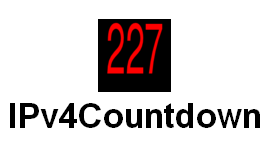| Fast running out of IPv4 addresses |
| Tuesday, 19 October 2010 | |||
|
The global body in charge of allocating Internet addresses, now has less than 5% of the total available and expects to hand them out early next year. The Number Resources Organization (NRO) has reported that the global pool of free addresses it manages now stands at just 12 blocks. Each block represents 16 million addresses, or 1/256th of the roughly 4 billion IPv4 addresses available which means that fewer than 5% remain. The NRO acts as a coordinating body, issuing blocks of numbers to five regional Internet registries, which in turn issue them to companies and organizations in their respective regions. The final five blocks will be distributed equally to the registries, meaning there are only seven more blocks available under the normal distribution system. Having recently allocated IPv4 numbers to the Regional Internet Registry (RIR) for the Asia Pacific region, Axel Pawlik, NRO chairman issued a statement:
"This is a major milestone in the life of the Internet, and means that allocation of the last blocks of IPv4 to the RIRs is imminent. It is critical that all Internet stakeholders take definitive action now to ensure the timely adoption of IPv6." The crisis point appears to be approaching faster than when we originally reported on this situation. Only 90 days have elapsed since IProgrammer posted the news Less than a year of IP addresses left and in the same period the IPv4 countdown on Twitter has gone from 343 days to 227 days, i.e. it is running almost a month fast.
The solution, however, seem to making steady progress. According to NRO, the switch to IPv6 is already well under way and much of the central infrastructure of the Internet is already running on the protocol. Although large sections of the network are yet to be converted, there doesn't appear to be a last-minute rush for IPv4 addresses, indicating "strong momentum" behind the adoption of IPv6.
<ASIN:0262013975> <ASIN:6130279574> <ASIN:1848827644> <ASIN:904813661X> |
|||
| Last Updated ( Tuesday, 19 October 2010 ) |

